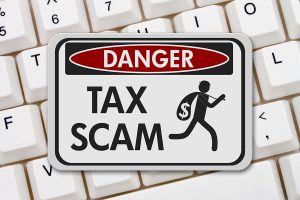Why Tax Time Means It’s CRA Scam Time

Money can be stressful. Add to it, the prospect of dealing with the Canada Revenue Agency (CRA) and we are likely to experience sweaty palms and heart palpitations. The CRA has a well-earned reputation for not being easy to deal with; lots of rules and regulations that inspire a stress-response in the public in general. This is why tax time means it’s CRA scam time.
Recognize the Scam
There are a variety of approaches used by those looking to part you from your hard earned cash and information. They call, they send email and text messages. Even send letters through the mail. They demand your personal information while threatening you with liens on your home or car, garnish your wages or seize your bank account. Threaten to take your passport or drivers license. They will even threaten arrest and jail. Of course, they tell you this can all be avoided if you make your account good right away. Payment is required to be made with money transfer, bitcoin, prepaid credit cards or gift cards.
Identifying Legitimate Communication from the CRA
By Phone
The CRA may:
– Verify your identity by asking for personal information such as your full name, date of birth, address, and account, or social insurance number.
– Ask for details about your account, in the case of a business inquiry.
– Call you to begin an audit process.
The CRA will never:
– Ask for information about your passport, health card, or driver’s license.
– Demand immediate payment by Interac e-transfer, bitcoin, prepaid credit cards or gift cards from retailers such as iTunes, Amazon, or others
– Use aggressive language or threaten you with arrest or sending the police.
– Leave voicemails that are threatening or give personal or financial information.
By Email
The CRA may:
– Notify you by email when a new message or a document, such as a notice of assessment or reassessment, is available for you to view in secure CRA portals such as My Account, My Business Account, or Represent a Client.
– Email you a link to a CRA webpage, form, or publication that you ask for during a telephone call or a meeting with an agent (this is the only case where the CRA will send an email containing links).
The CRA will never:
– Give or ask for personal or financial information by email and ask you to click on a link.
– Email you a link asking you to fill in an online form with personal or financial details.
– Send you an email with a link to your refund.
– Demand immediate payment by Interac e-transfer, bitcoin, prepaid credit cards or gift cards from retailers such as iTunes, Amazon, or others.
– Threaten you with arrest or a prison sentence.
By Mail
The CRA may:
– Ask for financial information such as the name of your bank and its location.
– Send you a notice of assessment or reassessment.
– Ask you to pay an amount you owe through any of the CRA’s payment options.
– Take legal action to recover the money you owe, if you refuse to pay your debt.
– Write to you to begin an audit process.
The CRA will never:
– Set up a meeting with you in a public place to take a payment.
– Demand immediate payment by Interac e-transfer, bitcoin, prepaid credit cards or gift cards from retailers such as iTunes, Amazon, or others.
– Threaten you with arrest or a prison sentence.
By Text/Instant Message
The CRA never uses text messages or instant messaging such as Facebook Messenger or WhatsApp to communicate with taxpayers under any circumstance. If a taxpayer receives text or instant messages claiming to be from the CRA, they are scams!
When in doubt
– Why is the caller pressuring me to act immediately? Am I certain the caller is a CRA employee?
– Did I file my tax return on time? Have I received a notice of assessment or reassessment saying I owe tax?
– Have I received written communication from the CRA by email or mail about the subject of the call?
– Does the CRA have my most recent contact information, such as my email and address?
– Is the caller asking for information I would not give in my tax return or that is not related to the money I owe the CRA?
– Did I recently send a request to change my business number information?
– Do I have an installment payment due soon?
– Have I received a statement of account about a government program I owe money to, such as employment insurance or Canada Student Loans?
At the end of the day, if anything about the communication doesn’t make sense then go directly to www.canada.ca and log into your My Account and see if the information is available to you there. Do not use any links or phone numbers provided to you through a suspect communication.
If you think you may be the victim of fraud or have been tricked into giving personal or financial information contact the Canadian Anti-Fraud Centre.
If the CRA has confirmed that your information has been compromised, they will act to prevent the fraudulent use of your information. This is limited to any and all systems used by the Canada Revenue Agency.
If you think your CRA user ID or the password you use with the CRA has been compromised, you can ask the CRA to disable online access to your information on the CRA login services. After access to your information is disabled, you may change your mind and want access again. If so, you can contact them and ask that your access be re-activated.
Contact Service Canada at 1-800-206-7218, if you suspect that your SIN has been stolen. For more information, see Social Insurance Number (Service Canada website).



